“It’s Never Over”
Seniors, pushed to the brink by Covid-19, are at the forefront of the fight for a Homes Guarantee.
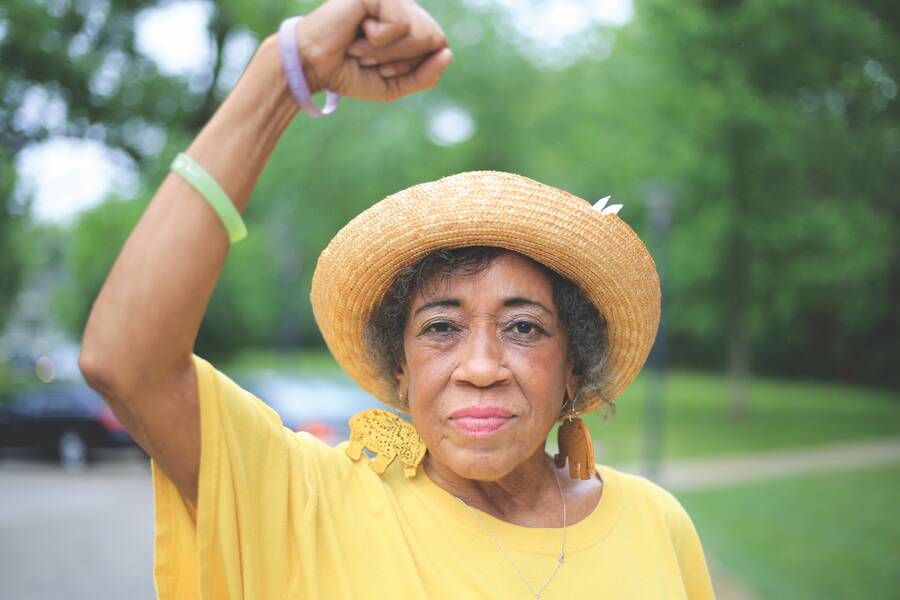
IT WAS EARLY MARCH, and Marsha Cole was exhausted. At 66, she was supposed to be retired. Instead, she was working two part-time jobs to keep her apartment, which crawled with bed bugs and had a stove on the fritz. With her name on dozens of waiting lists for subsidized senior housing and no relief in sight, Cole was teetering on the verge of homelessness.
Then the coronavirus hit. Suddenly, Cole’s cramped, dangerous, and unaffordable home became her entire world. Older Americans had already been struggling: The number of people aged 62 and older living in emergency shelters or transitional housing has risen by 69% over the last decade. But the pandemic has further pushed their struggle behind closed doors. Many older people now find themselves confined to dangerous, and often negligent, nursing homes, or clinging to increasingly precarious housing arrangements. Amid a health crisis deepened by government inaction, they have realized they must fight for themselves.
Yet this fight did not begin with the pandemic. Senior activists have been at the forefront of reimagining housing well before Covid-19 hit. Their work drafting and fighting for the Homes Guarantee—an ambitious legislative framework put together by the progressive organizing group People’s Action—is a model for a society that takes seriously seniors’ voices and needs.
First conceived in the summer of 2018, the Homes Guarantee would radically transform American housing. The platform calls for universal rent control, reparations for centuries of racist housing policies—in the form of mortgage reductions, debt cancellation, and direct payments to descendants of slaves—and a plan to expand state-owned social housing and impose stronger regulations on corporate landlords and real estate speculators. The Covid-19 economic crisis has only made these demands more urgent.
To hear from senior activists working on the Homes Guarantee about their organizing experiences, we went to two American cities—Chicago and Kansas City, Missouri—whose housing landscapes illustrate the set of interlocking crises people are facing around the country.
In the midst of large-scale gentrification, Chicago continues to grapple with the legacies of racist housing policies and “project” housing like Cabrini Green—once a symbol of the New Deal’s ambitious social vision, then a victim of systematic government disinvestment. In Missouri’s central metropolis, Kansas City, a history of housing discrimination still looms large, contributing to a jagged racial wealth gap. There are many more empty houses than homeless people—brutal poof of how market-based housing fails to meet people’s needs.
Senior activists in both cities are working with community organizations to address these injustices. The Jane Addams Senior Caucus, a Chicago grassroots group led by low-income seniors, is pushing the Housing Authority to improve living conditions in senior public housing, meet the housing needs of older immigrants, and battle private landlords raising rents on low-income seniors. In recent weeks, they have also pushed an indifferent mayor to win wellness checks for seniors—after several seniors found their neighbor’s bodies rotting in their apartments. Seniors working with the KC Tenants organizing group in Kansas City have led the fight against a particularly aggressive system of evictions and poor living conditions in corporate-owned housing. Last July, KC Tenants shut down eviction court for a day to protest the lifting of the moratorium on evictions.
The seniors we interviewed are fighting to change the institutions that have neglected them, and that will do the same to their children and grandchildren. They are also fighting for the right, in an increasingly commodified society, to come home.
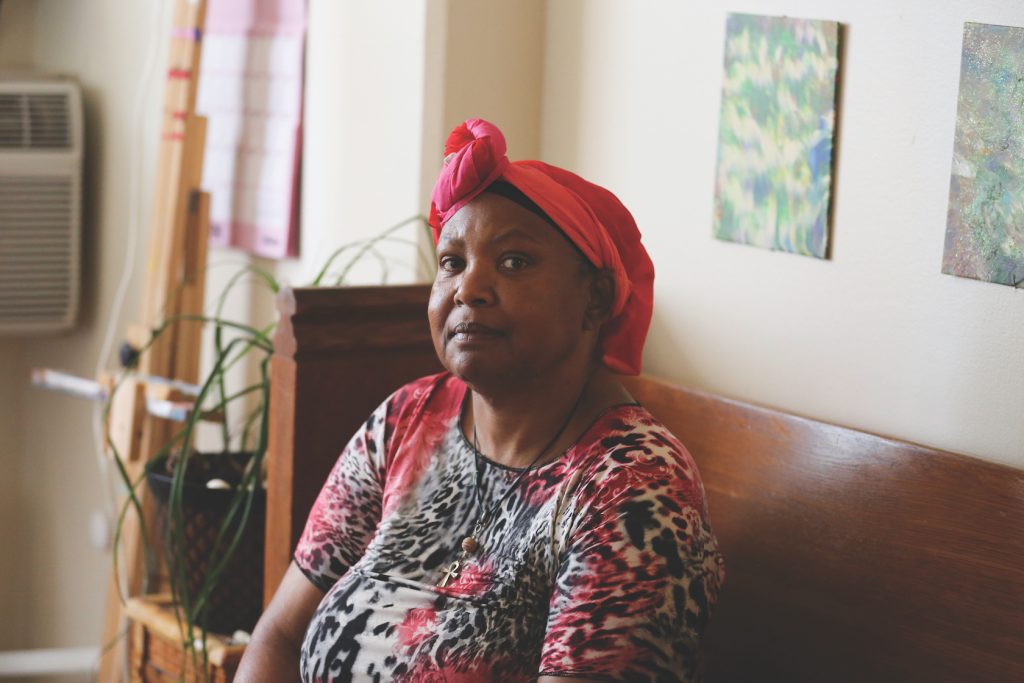
MARSHA COLE
Jane Addams Senior Caucus
Chicago, IL
During the beginning of the [2015] Black Lives Matter protests here in Illinois, my daughter and my twin grandchildren were marching. My grandson had the bullhorn at the head of the line yelling “Black lives matter!” About nine months later I asked, “Are you doing any more marching?” He said he was tired. He asked, “How many more times do you have to march?” And I said, “Till death do you part.” I said, “It is never over.”
My grandfather was a political community organizer way before they had that name. He would take all of us by hand—he had nine grandkids—and we followed behind him like little ducklings, going up people’s stairs, knocking on their door, asking them to vote. So that’s what I was from four years old. In my teens, I was a young Black Panther when they started the food program feeding kids in school after the Watts Riot in California.
I’m 66 now. And believe me, I am tired. But I can’t stop because I know the injustices won’t stop. They just keep going and going.
What have I learned? I have to fight and show you what fighting means so you know that you need to fight. Because it’s not someone else’s turn. It’s always your turn. I think that’s what people feel—that it’s someone else’s turn. It doesn’t really hit home to them until they have a really hard time when they’re looking for subsidized senior housing. When they try to live with dignity and they are on long waiting lists.
When I was looking for subsidized senior housing I was on twenty waiting lists for over two years. I had to get two jobs just to pay my rent. If you’re not getting subsidized housing, and food stamps, and the [low-income assistance] benefit on your utility bills, you cannot live off of Social Security. You just cannot.
We are fighting for ourselves—and whether the young people know it or not, we are fighting so that when they get to be 65 they don’t have to be on a three or four or five year waiting list for affordable housing. We’re tired. And if you ask other seniors they will all tell you that they are tired, but they can’t stop. I say what elders used to say to me: keep living and it will soon be your turn.
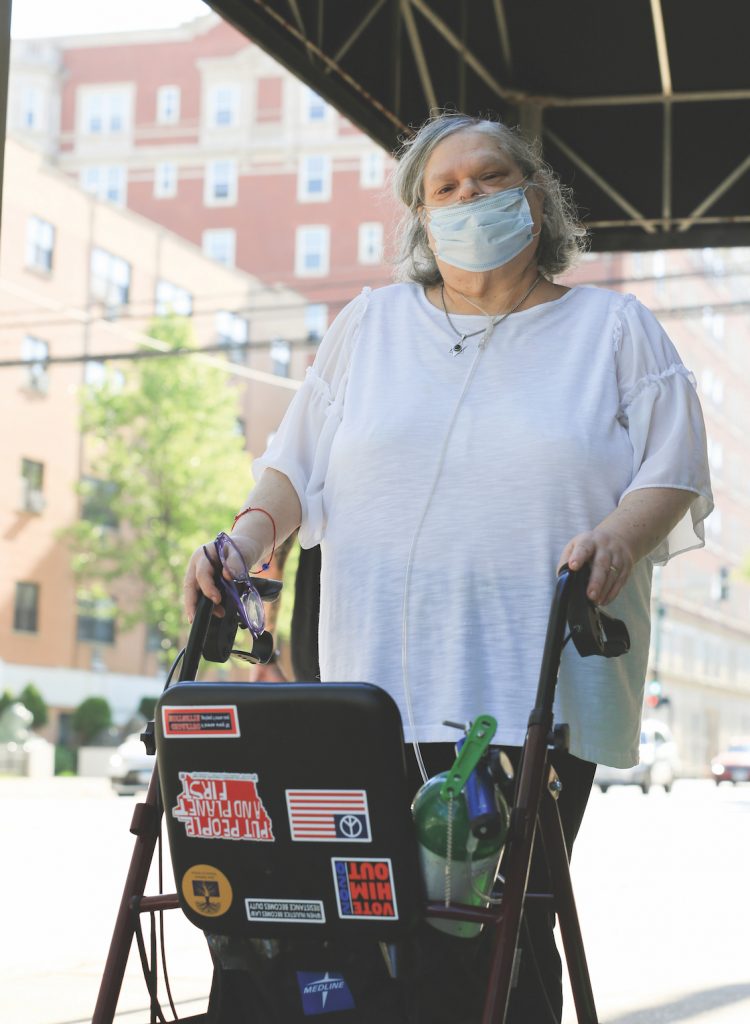
DEBRA MILLER
Jane Addams Senior Caucus
Chicago, IL
During the 2008 recession, my husband Jimi and I lost our jobs, ran out of unemployment and all our savings. We left before my landlord was going to evict us. We ended up in different shelters. My husband was on the West Side in the veterans’ shelter, and I was on the North Side. When I was in the shelter I met an organizer who told me that the Chicago Housing Authority had vacant units while I stayed homeless. So I started getting involved and speaking out.
There was a protest in front of the Chicago Housing Authority and Jimi and I spoke about being homeless. We were on the front page of the Chicago Tribune! When Jimi and I finally got housing we decided that we were going to give back and stay involved in organizing. I firmly believe in mitzvot. We’re on this earth to help people and bring each other up, to give out a helping hand. Every time we have a win, I want to celebrate, but it only leads me to thinking about another wrong we have to make right.
Seniors need to be at the forefront for a Homes Guarantee. We don’t just need housing for seniors; there should be no homelessness in the United States. I think it’s disgusting—that in this country there are children sleeping in the streets. There are families sleeping in their cars because there is no work and such high rents. And Bezos has billions. We need housing for our bottom line.
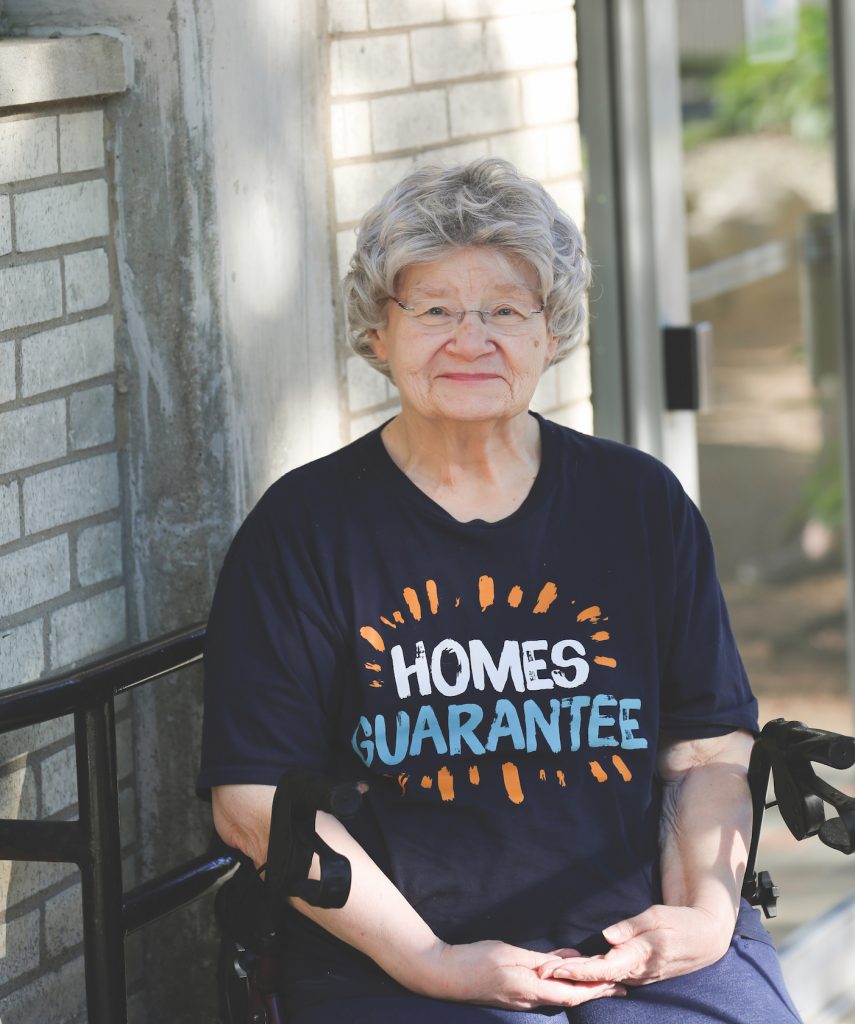
LINDA ARMITAGE
Jane Addams Senior Caucus
Chicago, IL
In the financial meltdown I lost my retirement nest egg and I had to find a more affordable place to live. So I found a wonderful place. It was owned by a nonprofit. Six months later they put it on the market to the highest bidder.
So we all—my neighbors and I—we applied for various affordable housing, subsidized housing, including public housing. The waitlist was years long. And we had literal nightmares. We’re going to be homeless.
One person doesn’t get any results. You just have to organize as a group. And I think that’s the most important lesson I’ve learned at the caucus: that the only way to win anything is to get together with people who feel the same way and push back, push back.
I know, and most of us seniors know that, you know, Medicare For All isn’t going to happen within our lifetimes. The Homes Guarantee, that’s not going to happen in our lifetimes. But it’s really important to be laying some groundwork and showing people that you’ve got to get organized, you’ve got to keep the ball rolling here, don’t give up. And just passing the baton to the younger group.
Especially now, it’s tough. I feel sometimes like, Oh, my God, we’re fighting Goliath. We’re David and Goliath. And when you start fighting the system, doing actions against the American Medical Association—which our organization has done—it can get depressing. But you know, it’s so uplifting to think that you’re not alone. There are people, there are lots of people, who are willing to do this. And we have to—especially seniors, but certainly young people—we have to take care of ourselves. Especially now.
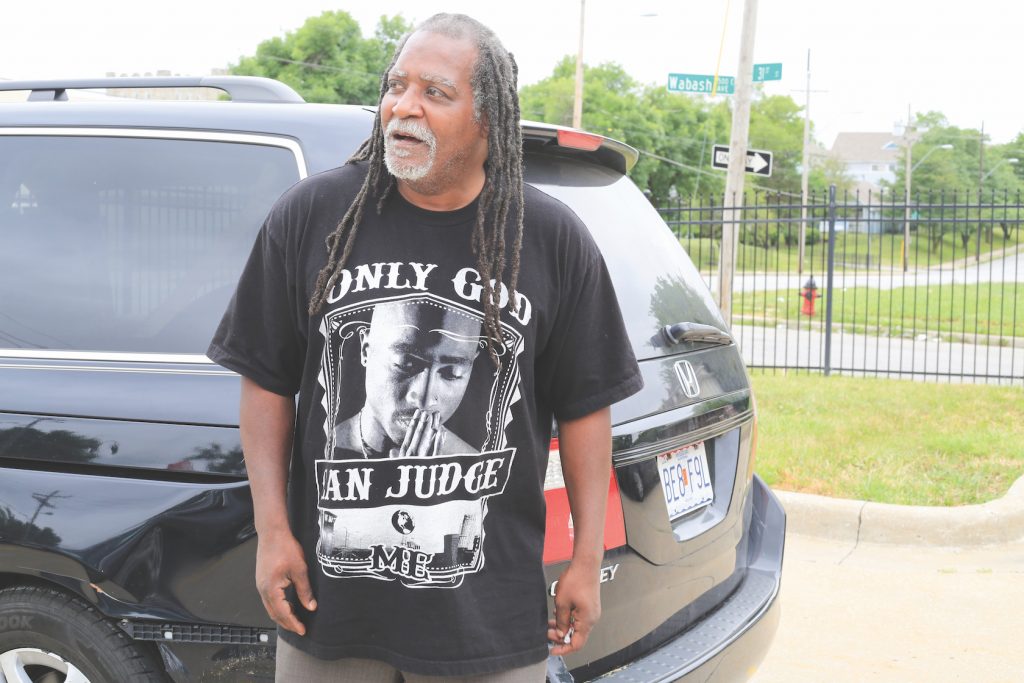
QUADAFI
KC Tenants
Kansas City, MO
My situation: I get out of prison on August the 9th. August the 10th I was homeless.
We’re not allowed to leave prison unless we have somewhere to be paroled to, so a lot of people come out into compromised situations. Every person that comes out, nine times out of ten, they are homeless. There isn’t enough transitional housing. They don’t come out having money to pay rent or bills. Everybody that comes out should automatically have some place that they could go, without having to arrange it themselves. If they don’t have that, if they have to arrange it themselves, people do all kinds of crazy stuff. That’s why the recidivism rate is so high.
I had been organizing in prison. They say I am a leader. I accept that. I don’t know how, but I accept that. Someone said there’s this group, KC Tenants. I have a unique style, but KC Tenants allowed me to help them. They allowed me to give suggestions on tactics. Now I’m on their strategy team, working on how to do direct actions. I’m a lot more radical, and I’m told that is good, that I’ve pushed them to new heights. Some of my suggestions they took—they moved in my direction—and I’m like, damn, they are actually listening to me. KC Tenants ain’t no joke.
In prison, we didn’t have strategy meetings. Everything we were doing we had to think on our feet. We didn’t have the luxury of planning. One wrong decision could mean somebody’s life.
I believe people closer to the problem are closer to the solution. People with textbooks from Yale don’t mean shit. It’s gonna have to come from the bottom up and not the top down. Until people like me are included and not excluded, it’s going to continue to get worse.
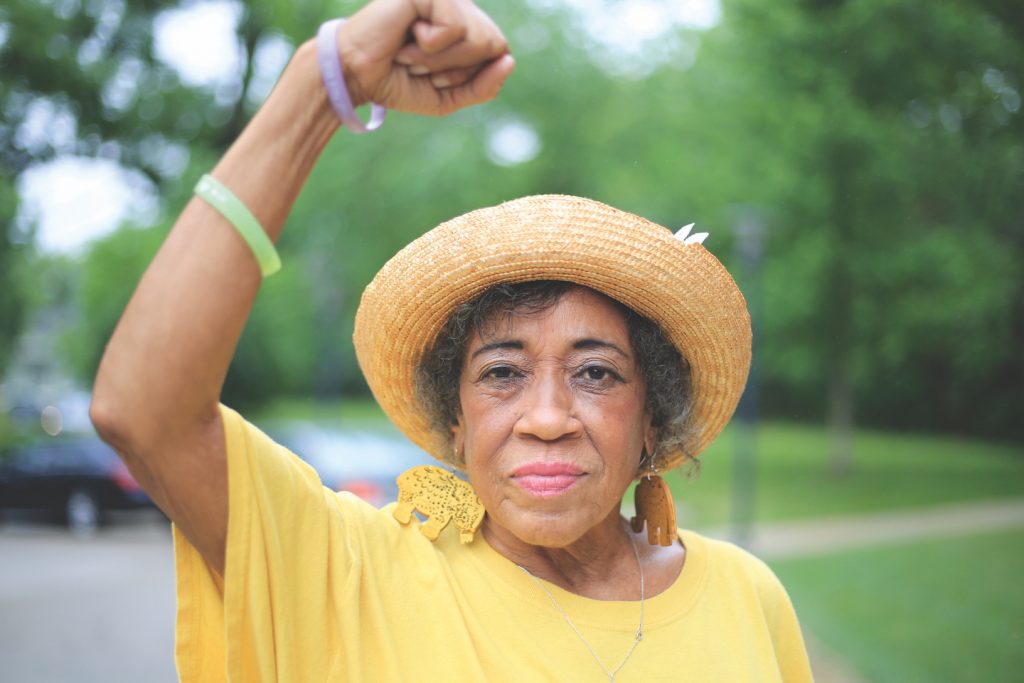
DIANE CHARITY
KC Tenants
Kansas City, MO
I’ve been at this since my mom had us out protesting when I was about 12. Now I’m 70. We protested for the integration of our Kansas City, Missouri downtown. We just kept on that movement.
I got radicalized on the board of Parade Park Homes, which is a housing cooperative in Kansas City. When it was established in 1962, it was a project by the Alcoa Foundation to see if they could build homes from aluminum. It wasn’t meant to last 10 years. Even though it’s flailing now, it’s lasted until now. Everyone who moved into the co-op were part owners, and we learned how to take care of it, how to maintain a safe environment, knowing it’s ours. I ended up being president of the co-op, which housed 2,500 people.
In 1991, my son was shot in the co-op walking from my house to my mom’s house. Somebody called me on the phone and said, “Now that Michael has been shot, I know you’re getting ready to move out of there,” and I said, “I sure am. I’m going to move to the moon.” It dawned on me that wherever I go, it’s going to be like that unless I demand it gets better.
What I did empower those neighborhoods with is that the city ain’t gonna do jack shit for you—you have to do it for yourself. That’s the basic right, to be able to lay your head down. Housing is really the basis. It’s the basis of education. If a baby is couch-surfing because a mama got evicted, how stable is his education?
My dream is to see a whole lot of Parade Park–type housing. We have 1,000 vacant houses and 2,000 homeless people. Let these folks move in! Train them how to maintain it and offset their cost. Don’t tear them down, fix them up.
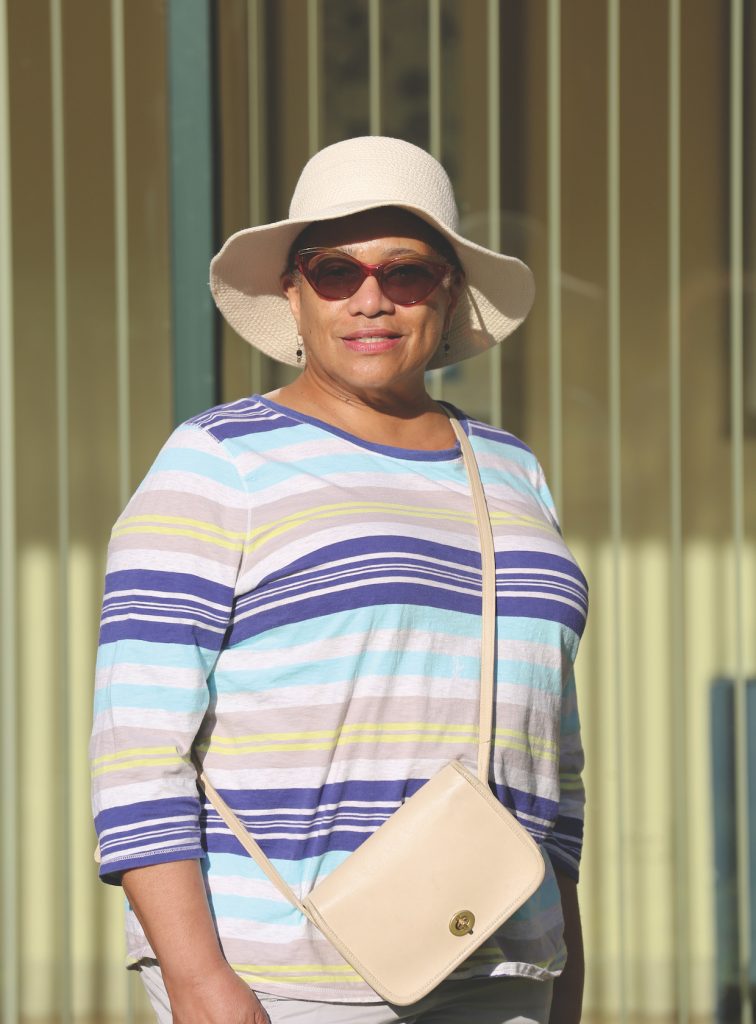
CARMEN BETANCES
Jane Addams Senior Caucus
Chicago, IL
When I was about nine years old, my dad was an auto mechanic and he serviced judges’ and policemen’s vehicles. One of the judges visited us in the Bronx at 459 Claremont Parkway. He was so upset over the way my family was living—I mean, we were living in deplorable conditions. So right away he went into his car and got an application for NYCHA, New York City Housing Authority. We were one of the first families to move into Claremont Village. I mean, brand spanking new. Beautiful place, but how quickly it deteriorated in just ten years.
I couldn’t understand why that happened to our building, our home. Later on, I knew why. Those inferior building materials! It was the cheapest way to build up, up, up. But using the cheap way you have to pay even more money, because you have to fix all these things.
Then I found myself owning a home and doing the middle class “American dream,” raising a family in Chicago. It was a neighborhood where people looked out for one another. Later these huge million-dollar places were built and other people like me had to pay the same amount of taxes that those buildings had to pay. As these people they call “yuppies” or whatever moved in, there was no neighborly attitude anymore. There was no love. Because of this gentrification I had to sell my house and go into [public] housing.
Seniors are faced with a culture that denies us a right to live. I organize around housing because if there is no one supporting the senior population, we will lose history. I believe housing is a right, that you must have a connection to a place where you’re safe.
I describe myself as having life until I have no more. I have a lot to bring to the table to make a better life for the next generation. And I would love to leave here knowing that I did my job in preparing the generation after me. Who better than someone that has this experience? I have fallen and I have risen.
Yana Kunichoff is a Chicago-based investigative journalist and documentary producer who recently spent time reporting from Moscow. In 2016, she won a Sidney Hillman award for an investigation into fatal police shootings.
Kelly Viselman is a photographer and community organizer with the Jane Addams Senior Caucus and the Homes Guarantee campaign. She is based in Chicago.

